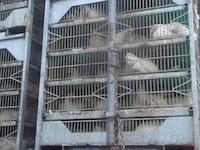BOB GARFIELD: About a hundred years ago, a novelist named Upton Sinclair went undercover in the meatpacking industry to portray the plight of immigrant America. The resulting book, The Jungle, was so evocative and so disturbing that it changed how the country thought about its food supply and its factory workers.
Countless journalists have since employed the same undercover tactic, many of them to expose the hidden corners of our food supply. But two states, Iowa and Minnesota, are now considering legislation that would effectively criminalize such reporting. A third state, Florida, failed to pass its own similar bill earlier this month.
Will Potter is the author of Green is the New Red. He says the various bills all have some key provisions in common.
WILL POTTER: They all include very similar provisions, prohibitions against any audio or film recording of what takes place in so-called animal enterprises and agriculture enterprises, including factory farms, animal experimentation facilities, puppy mills, fur farms. So these bills are actually so broad that anyone who not only is involved in the investigation but merely possesses the video or audio recording could be targeted through them.
BOB GARFIELD: It would cover not only activists who may be motivated to kind of cook the books in the reporting, but journalists or anyone else for that matter, reporting factually, truthfully and without any sort of preconceived ideology.
WILL POTTER: And also even among the people that clearly have politics and who clearly have an interest or they're working for a group like the Humane Society or Mercy for Animals, another animal protection group, they haven't been accused of doing something like cooking the books. I mean, their video documentation has been publicly available and industry has had a bad public image because of that, but there hasn't been a challenge to the accuracy of what takes place on those tapes.
BOB GARFIELD: There’s an axiom in reporting, to find out who benefits. A corollary to that might be who is lobbying on behalf of. Who is lobbying on behalf of legislation that would criminalize undercover reporting?
WILL POTTER: All the usual suspects. For instance, in Iowa, Florida and Minnesota some of the politicians who have been the most vocal in support of it have either worked themselves for the pork and agriculture industries or they're on different boards of directors of organizations or they've been guest speakers.
I mean, they all publicly tout this on their campaign websites, the ties that they have to these industries because, depending on the states they're from, that helps them get elected.
BOB GARFIELD: Let us agree that if we were confronted with video of an abattoir, we couldn't help but confront the nitty-gritty of how we get our meat. Is it necessarily fair to the producers of meat who maybe are running as ethical an operation as you could possibly imagine, to suffer the consequences of the public being just pummeled with shocking images?
WILL POTTER: Well, and one thing the industry has been saying is that these organizations are compiling the worst of the worst, and there’s certainly some truth to that. But also, these organizations are documenting what’s truly standard industry practice. And I think that should be the takeaway of this, is that the standard industry practices, when exposed to the public, are just as egregious and just as offensive.
Most people don't understand what a factory farm actually is and how 99 percent of the industry operates. And I think that’s what the real concern is, that if that’s exposed, we're going to need another series of systemic changes like we saw after The Jungle.
BOB GARFIELD: The proposals here are for special legislation. Are there no remedies under existing law in these three states, and the other forty-seven, to deal with fraud, to deal with libel or, you know, any other law that may be broken in the service of collecting this kind of undercover material?
WILL POTTER: If the companies want to allege that they've been defrauded or defamed or maligned through manufactured video, there are all laws on the books to target all of those things. But that’s not what this is about. It’s not about a lack of tools available to prosecute. It’s about the lack of a political will to do so.
And I think that’s what’s the concern to these industries. They have to make sure that these people doing the investigating are the ones who are guilty. They're the ones who are the criminals and not the people actually engaging in these practices.
BOB GARFIELD: It’s taken decades in this country for what used to be considered fairly radical views on civil rights and human rights and the environment to become kind of conventional wisdom. Do you get the sense that we are on the cusp, because of the kind of videos that the industry, that the agricultural industry is so afraid of, that this society is on the cusp of utterly rethinking what has, till now, been the norm?
WILL POTTER: Absolutely. The conclusion that I drew through working on this project for so long is that in a very short amount of time, these social movements have made truly radical advances in how we're thinking about food, transportation, climate change, animal experimentation, logging, all of these issues.
If these organizations and activists continue on this path, I mean, they're, they're fundamentally challenging, in my opinion, what it means to be a human being, and challenging how we view our interactions with other species, and raising very serious ethical, moral and practical questions about how we should be living our lives. That’s a very threatening set of accomplishments.
BOB GARFIELD: All right, Will. Thank you very much.
WILL POTTER: Thank you for having me.
[MUSIC UP AND UNDER]
